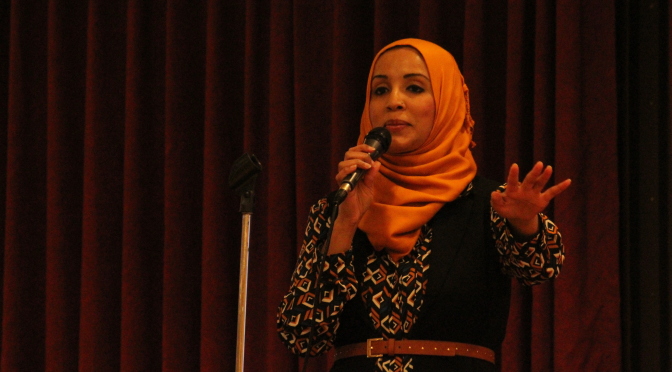
MSA tackles myths of women in Islam
By: Bailey Hendricks, Assistant News Editor
An outreach manager for the Council on American Islamic Relations debunked myths about Muslim women Nov. 19 and railed against the idea that all women within the culture are oppressed.
“There have been so many people who have spent so much time defining who we are — speaking for us without allowing us to speak for ourselves,” Maryland Outreach Manager Zainab Chaudry said.
“But more Muslim women are challenging the status quo. We’re reframing the narrative that boxes Muslim women in this very black and white, one-dimensional or two-dimensional dichotomy.”
Chaudry spoke on campus during the Muslim Student Association-hosted “Jewels of Islam” discussion of female Muslim identity and increased Islamophobia following this year’s presidential election. Chaudry delivered the event’s keynote address, which came after a group Isha prayer, the fifth and final prayer acknowledged by practicing Muslims within one day.
A handful of Muslim-majority countries have had female heads of states, but America still has yet to welcome a female into the oval office, Chaudry reminded attendees.
“A lot of people think a woman’s place is in the house, and I don’t entirely agree with that,” Chaudry said. “I think a woman’s place, regardless of her religion, is in the house — the House of Representatives that is — and the Senate, and the Oval Office.”
During her address, Chaudry tackled misconceptions related to violence and other human rights violations. According to Chaudry, “there is absolutely no basis in Islam that supports either honor killings or forced marriages,” and Islam does not support female genital mutilation, an ancient practice that pre-dates the religion.
Some cultures that have embraced Islam have also performed female genital mutilation, but Chaudry cautioned against confusing culture with religion.
According to MSA Community Service Chair Lyric Harris, the organization planned “Jewels of Islam” in order to address women’s rights and their roles in Islam. Harris said a lot of people came up to her and asked what her role in Islam was after the election.
Chaudry said that she suspects marginalized groups will face a very challenging time throughout the next four years, but she encouraged members of those groups to stand together in solidarity and rise from intolerance.
“The challenges that we’re facing right now and the challenges that we’re going to be facing in the future are an opportunity for us to work together and become stronger in our identity as Muslims, as Americans, and to be able to build stronger coalitions,” she said.

